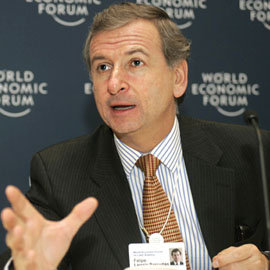 |
“We’re not singing victory,” says Felipe Larraín. But he has made impressive progress against considerable odds If, in his former job as an economics professor at the Catholic University in Santiago, Chile’s finance minister Felipe Larraín had been asked to mark his country’s economic performance over the past decade, he would have given it a ‘could do better’. In the decade to 1997, Chile grew at more than double the world average, he points out, but has since slipped below it.
With the aim of changing that – or, as he puts it, “restarting the economy” – he worked closely for two years with Sebastián Piñera, the centre-right’s presidential candidate, to draw up the economic programme that was a key factor in Piñera’s election, after two decades of government by the centre-left Concertación coalition.
“Our message was not to break away from the past and Chile’s counter-cyclical fiscal policy, but to build on it,” says Larraín.
The Piñera government’s goals include average annual 6% growth over its four-year term, the creation of 200,000 jobs a year and an end to extreme poverty. And 52-year-old Larraín, who – like Piñera – holds a PhD in economics from Harvard University, was looking forward to implementing it. “Although I’ve been an adviser to many governments, this is my first opportunity to do it myself,” he says.
But, on February 27, just 12 days before Piñera took office as president, one of the world’s worst earthquakes in over a century devastated large swathes of central and southern Chile, potentially also tumbling the incoming government’s carefully-laid economic plans. “We realized the immediate priorities had changed, but we also decided we couldn’t abandon our goals,” says Larraín.
In other words, the new government would face a double task – rebuilding after the destruction caused by the earthquake while, at the same time, delivering on its election promises. Even for a self-confessed workaholic like Larraín, that has meant some unusual working hours.
The author of 10 books and many academic papers, he admits to missing the comparative peace of university life and his seats on company boards. However, he is happy with the way the finance ministry has met its first key challenge of drawing up a plan to finance the estimated $8.4 billion, four-year cost of the government’s programme and the $9.3 billion needed to rebuild public infrastructure.
Rather than relying solely on the sovereign wealth fund that Chile accumulated during the 2004–08 boom in the price of copper, its main export – “the easy but not the best answer,” says Larraín – it devised a diversified plan that includes tax increases – “contrary to what you’d expect from a centre-right government” – and Chile’s two recent successful placements on the international bond market.
And, recovering more quickly than expected from the earthquake, the economy is building up a powerful head of steam, with year-on-year growth in the second quarter reaching 6.5%. That is, however, largely the lagged effect of last year’s expansive monetary and fiscal policies, rather than a merit of the present government, and the international economy could still play the small, export-led Chilean economy a bad turn.
“We’re not singing victory,” admits Larraín. In other words, if he were still a professor, the mark he would probably give is ‘keep up the good work’.